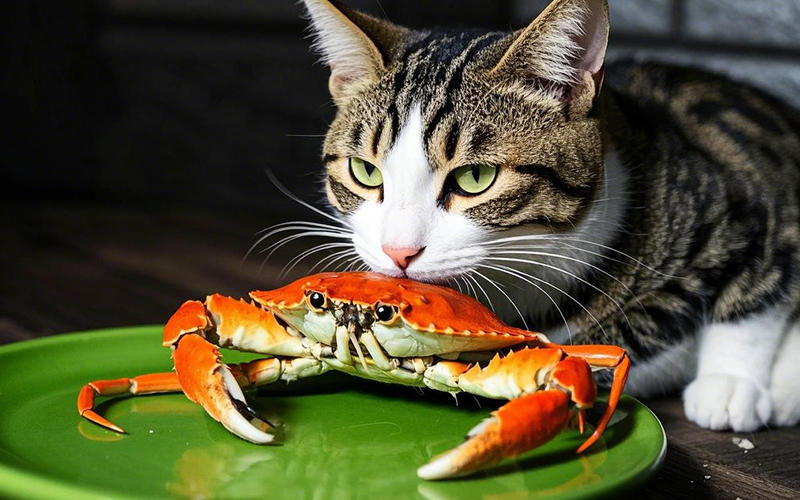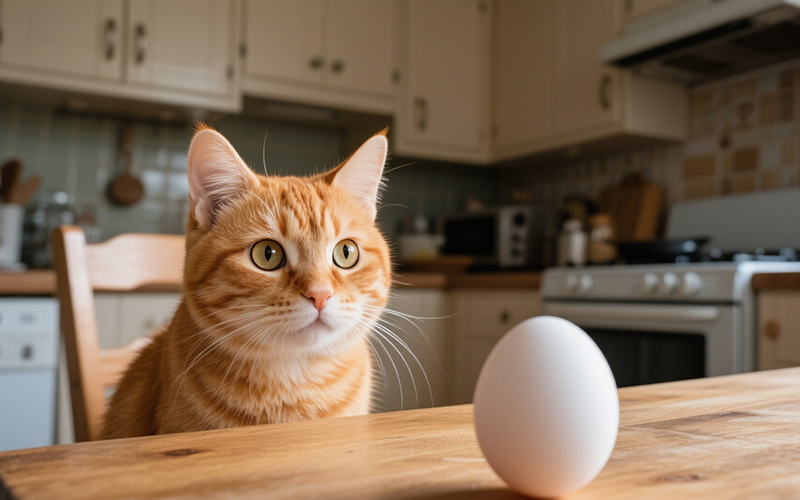Can Cats Eat Egg Yolk? What You Need to Know
- 4 Mar 2025 10:53
Eggs are a common household food that many pet owners might wonder about when it comes to sharing with their cats. While most people know that eggs can be a good source of nutrition for humans, you might be asking, can cats eat egg yolk? The short answer is yes, cats can eat egg yolk in moderation. However, there are some important factors to consider before offering egg yolk to your feline companion.
In this article, we’ll explore whether egg yolk is safe for cats, its potential benefits, and the precautions you should take when feeding it to your pet.

Is Egg Yolk Safe for Cats?
✅ Yes, Egg Yolk is Generally Safe for Cats
Egg yolk is not toxic to cats, and when fed in moderation, it can provide some nutritional benefits. It’s a great source of protein, healthy fats, vitamins, and minerals that are beneficial for your cat's health. However, like with any treat, it should only be given occasionally and in appropriate portions.
❌ Things to Keep in Mind When Feeding Egg Yolk to Cats
Even though egg yolk is safe in small amounts, there are some things to consider:
Moderation is Key
Egg yolk is high in fat and cholesterol, so feeding it to your cat in large quantities is not ideal. Too much fat can contribute to obesity or pancreatitis in cats. A small piece of egg yolk as an occasional treat is sufficient for most cats.Risk of Salmonella
Raw eggs, including egg yolks, may contain salmonella bacteria, which can cause food poisoning in both humans and animals. To minimize the risk, it’s best to cook the egg yolk before offering it to your cat. Cooking the egg will kill any harmful bacteria while still providing the nutrients.Allergic Reactions
Just like humans, cats can have food allergies. While egg yolk is generally safe, it’s important to watch your cat for any signs of allergic reactions, such as vomiting, diarrhea, or skin irritation after introducing it into their diet. If any of these symptoms occur, stop feeding your cat egg yolk and consult with a professional.Balanced Diet
Cats are obligate carnivores, which means their primary diet should be based on animal protein. While egg yolk can be a healthy treat, it shouldn’t replace their regular meals or provide the bulk of their nutrition. Always ensure that your cat is getting the proper balance of nutrients from their main diet.
Health Benefits of Egg Yolk for Cats
When given in moderation, egg yolk can provide some important health benefits for your cat:
1. High-Quality Protein
Egg yolk is a great source of high-quality protein, which is essential for muscle maintenance and overall health. Protein is a crucial part of a cat’s diet, as they need it for energy and to support their muscle and tissue repair.
2. Healthy Fats
Egg yolk contains healthy fats, which are important for maintaining a shiny coat, healthy skin, and overall cellular function. Omega-3 and omega-6 fatty acids found in egg yolk can help reduce inflammation and improve joint health.
3. Vitamins and Minerals
Egg yolk is rich in vitamin A, vitamin D, vitamin B12, and folate—all essential vitamins that support your cat’s immune system, vision, and overall well-being. It also contains choline, which is important for brain function and liver health.
4. Supports Digestive Health
The proteins and fats in egg yolk can support a healthy digestive system and help regulate your cat’s bowel movements, especially when introduced in small amounts as a treat.
How to Safely Feed Egg Yolk to Your Cat
If you choose to feed egg yolk to your cat, here are a few guidelines to ensure it's done safely:
Cook the Egg
Always cook the egg yolk before offering it to your cat. Scrambling or boiling the egg is a safe way to prepare it. Avoid using any seasonings, butter, or oils that might be harmful to your cat.Remove the Egg White
While egg yolk is beneficial, the egg white contains avidin, a protein that can interfere with the absorption of biotin, a vitamin important for skin and coat health. Although it’s unlikely to cause a deficiency with one egg, it’s a good idea to focus on offering just the yolk to avoid potential issues.Start with Small Portions
Introduce egg yolk slowly into your cat’s diet. Offer a small portion and watch for any signs of digestive upset. If your cat tolerates it well, you can continue to offer it as an occasional treat.Don't Overdo It
Egg yolk should only be given as an occasional treat and should not make up a large portion of your cat’s diet. Too much can contribute to weight gain and digestive issues due to its high fat content.
Alternatives to Egg Yolk for Cats
If you’re looking for other healthy, protein-rich treats for your cat, here are some great alternatives:
Cooked Chicken – A lean source of protein that’s easy to prepare and loved by cats.
Turkey – Another great source of protein that cats enjoy.
Small Pieces of Fish – Salmon or tuna (cooked) can be a healthy and flavorful treat for your cat.
Freeze-Dried Meats – These are high in protein and generally free from additives, making them a healthy option for treats.
Catnip – A fun and safe treat that many cats enjoy for stimulation.
Conclusion: Can Cats Eat Egg Yolk?
✅ Yes, cats can eat egg yolk in moderation. It offers valuable nutrients, including protein, healthy fats, and essential vitamins that can benefit your cat’s health.
⚠ However, make sure to cook the egg yolk to avoid the risk of salmonella, and offer it in small portions to prevent any digestive upset or health issues from excessive fat intake.
💡 Need help managing your cat’s diet? Consider using PettureX, a 24/7 AI-powered pet health assistant that offers instant consultations and image recognition to ensure your pet’s diet and overall health are on track. PettureX is a great tool for helping you make the best food choices for your cat.
If you have more questions about your cat’s diet, feel free to ask! 🐾🍳
Related

Can Cats Eat Egg Yolk Raw? A Vet's In-Depth Guide to Feline Nutrition & Safety
- 10 Jun 2025
Can Cats Eat Dog Kibble? Unpacking the Nutritional Mismatch!
- 29 May 2025
Can Cats Eat Deli Turkey? Slicing Through the Facts for Your Feline!
- 29 May 2025
Can Cats Eat Deer Meat? Exploring Venison for Your Feline!
- 28 May 2025
Can Cats Eat Corned Beef? Unpacking This Salty Human Delicacy!
- 28 May 2025
Can Cats Eat Cooked Rice? The Grain Truth for Your Feline Friend!
- 27 May 2025
Can Cats Eat Cornbread? A Crumb of Truth for Curious Cat Owners!
- 27 May 2025
Can Cats Eat Cooked Meat? Sizzling Facts for Your Feline's Feast!
- 26 May 2025
Can Cats Eat Chili? Spicing Up the Truth About This Human Dish!
- 26 May 2025
Can Cats Eat Chicken Eggs? Cracking the Code on This Feline Food Query!
- 24 May 2025
